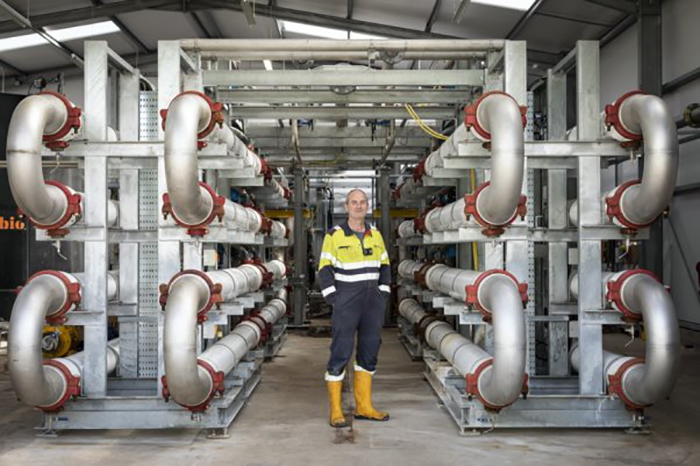Bridge of Weir Leather, expert supplier of Fine Automotive Leather to the world’s most respected luxury car brands, reveals today that it manufactures the lowest carbon intensity leather for the automotive sector, independently verified by Life Cycle Analysis.
Sector-leading announcement comes as parent company, Scottish Leather Group publishes its 2021 Sustainability Report, detailing the company’s progress towards its goal of zero impact leather manufacturing.
The group, which also manufactures for the aviation, rail, furniture, and luxury goods sectors, further announces that it is on track to being carbon neutral by 2025 – twenty years ahead of Scotland’s net zero ambitions.
This long-term commitment to responsible and sustainable manufacturing has been driven by a series of significant, multi-million-pound investments implemented over the last twenty years, with forward thinking initiatives such the Thermal Energy Plant (TEP) and Water Treatment & Recycling Plant (WTRP) enabling Bridge of Weir – and the group’s other businesses – to manufacture the world’s lowest carbon intensity leather measured at 1.1kg of CO2 per hide.
This year, the implementation of Life Cycle Analysis (LCA) is a further step towards realising the company’s goals and delivering its future commitments. Life Cycle Analysis, conducted by independent consultants, enables the business to measure the long-term effects of its activities, verify its supply chains and identify opportunities to reduce its overall impact. The company’s unique lowest carbon leather, as measured and validated by LCA, directly supports its automotive customers and their journey to net zero carbon emissions across their entire supply chains.
Dr Warren Bowden, Sustainability and Innovation Director at Scottish Leather Group, said: “We believe that leather is a naturally sustainable product and that it should be produced in a responsible manner too. Over the last two decades, our pioneering approach has seen it reduce our CO2 per hide from 10.3kg per hide to 1.1kg per hide – a decrease of 90% – and we are fully committed to lowering this figure even further, with the long-term goal of net zero carbon by 2025.”
“Our Life Cycle Analysis is a powerful ‘carbon accounting’ tool for measuring how responsible our consumption of raw materials and our production of leather is, enabling a true and fair comparison against the impact of other products and materials. This rigorous measurement fully supports the strategic approach of the Scottish Leather Group and provides Bridge of Weir’s customers, the world’s most respected luxury automotive brands, with independently verified sustainability data.”
Long-term commitment
Since 2003, Bridge of Weir has pioneered and patented circular manufacturing processes that minimise waste to landfill and radically reduce the carbon footprint, while its multi-million-pound Thermal Energy Plant [TEP] reclaims energy as steam and uses a proportion of this heat to directly power its tannery.
All the raw hides used in leather-making are a by-product of the local beef and dairy industries, of which over 98% are sourced locally within the UK and Ireland. This includes over 79% of all the grass-fed livestock in Scotland, classified as carbon neutral, according to Quality Meat Scotland. Bridge of Weir’s raw hides are always sourced from responsible suppliers with 100% traceability and without risk of deforestation.
It is this local provenance that guarantees farm-to-finish traceability, verifying animal welfare, net-zero and low-carbon farming, and ethical agroforestry. Importantly, it is the company’s commitment to both the responsible sourcing of raw materials and innovative sustainable manufacturing processes that enables the lowest carbon footprint of all automotive leather manufacturers.
Bridge of Weir sources natural, clean, local water from its own loch – its Water Treatment & Recycling Plant (WTRP) plant enables the recycling of up to 40% of treated water back into use within production – while its world-class tannery uses 50% less water per hide than the industry standard.
Future commitment to further reduce emissions
Through its Life Cycle Analysis, Bridge of Weir has identified a series of opportunities to further lower its carbon intensity in the future.
Dr Warren Bowden continued: “The current LCA uses generic farming data, not specific ‘primary’ data which is based on Scottish farming – widely recognised as being net zero – so there is a potential for Bridge of Weir’s CO2 impact to be even lower once this is factored in. Added to this, we are also working on a series of innovations, including biobased alternatives to existing tanning agents and novel tannages which utilise technology and pioneer new techniques.”
“Scottish Leather Group is planning to source renewable gas to reduce the carbon impact and continue the increased utilisation of self-generated or recovered heat. We believe we can also become net carbon positive if we switch to green gases and continue to export biofuel.”
Jamie Davidson, Sales Director, Scottish Leather Group, concluded: “Bridge of Weir has been manufacturing the finest sustainable leather for the automotive industry for more than a century – and innovation is at the heart of what the business does.
“We are proud that our journey to zero, measured by rigorous analysis, leads the leather industry, and supports our valued customers, the world’s leading premium and luxury car makers, in achieving their own sustainability targets and meeting the demands of their consumers.”

COMMENTS